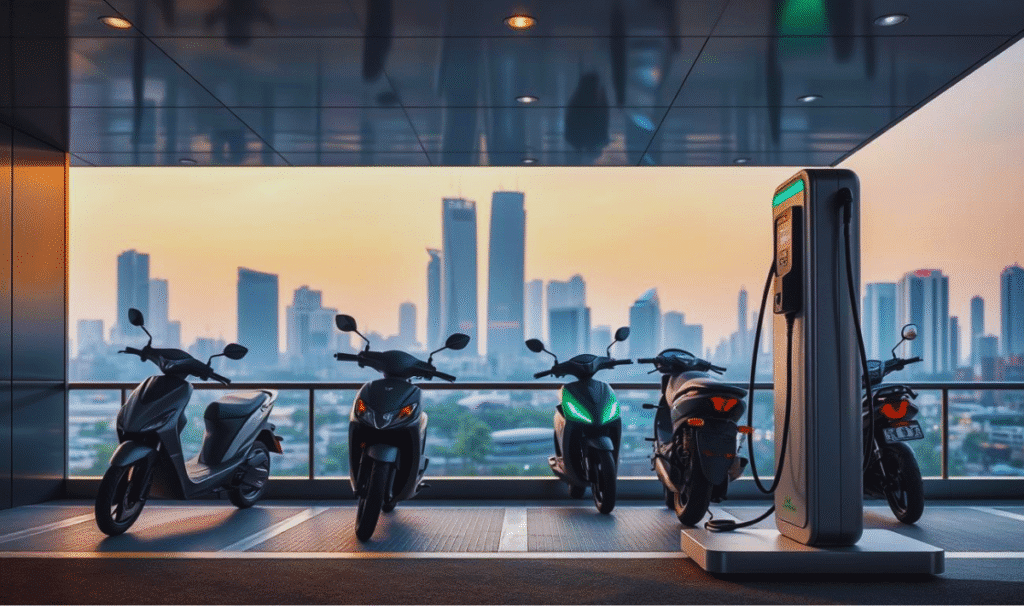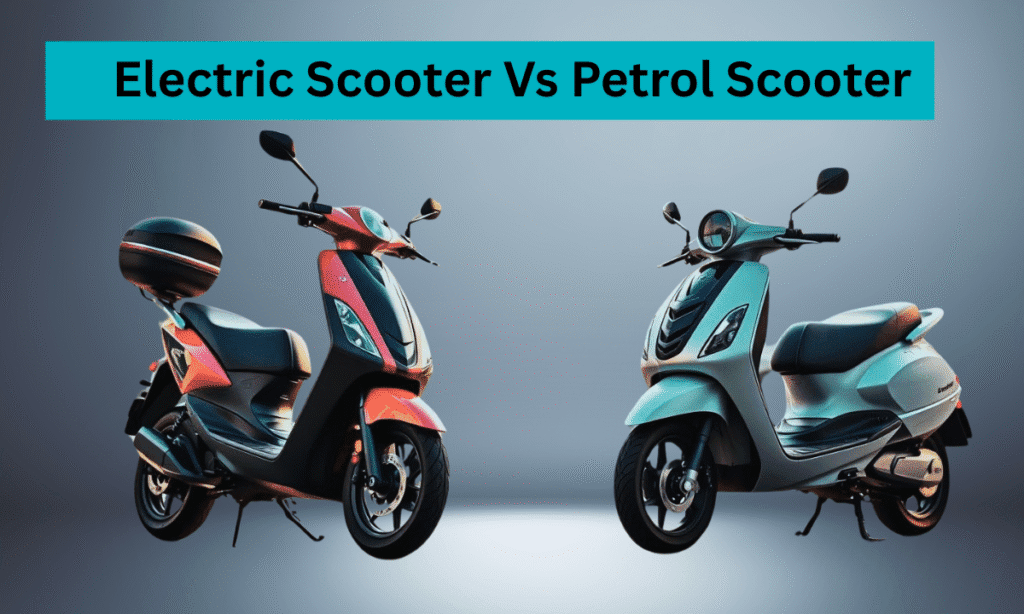Is it Better To Buy An Electric Scooter Or A Petrol Scooter ? The choice between an electric scooter or a gasoline scooter is more than a simple choice of personal taste, it’s also a wise economic and environmentally conscious choice. In the face of rising prices for fuel and increasing attention to environmental sustainability, you must consider your options thoroughly before you make a decision.
In this thorough review, we’ll assist you to comprehend the cost, effectiveness, performance, as well as the long-term advantages from petrol and electric scooters, so you know which best suits your needs.
Understanding the Basics

How Electric Scooters Work
Electric scooters are powered by motors powered by batteries. The rechargeable batteries – typically lithium-ion–store power that powers the motor. The majority of models are recharged using an ordinary electrical outlet in your the home.
- Type of battery: Lithium-ion (preferred for long-term durability and high efficiency)
- Charge duration: 4-6 hours on an average (fast chargers may lower the time)
- Motor power In watts Higher wattage means more power for climbing and higher pickup
How Petrol Scooters Work
Petrol scooters are powered by the internal combustion engine (ICE) that runs with gasoline. They are tested over time and extensively utilized throughout India.
- The engine capacity is The typical engine capacity is 110cc- 120cc to be used for day-to-day usage
- Transmission CVT (automatic) Easy for novices
- Efficiency of the fuel: Around 40-60 km/l based on the model.
Key Differences at a Glance
| Feature | Electric Scooter | Petrol Scooter |
|---|---|---|
| Fuel Type | Electricity | Petrol |
| Running Cost | Rs0.25-Rs0.50/km | Rs2.5-Rs3/km |
| Maintenance | Very low (no oil, less parts) | More (engine maintenance is required) |
| Noise & Emissions | Silent & eco-friendly | It is loud & releases CO2. |
| Range | 60-150 km per charge | 200-400 km per tank |
| Refueling | 4 to 6 hours (charging) | 2-5 minutes (fueling) |
Cost Comparison: Initial vs Long-Term

Initial Purchase Cost
Electric scooters typically cost between Rs10,000 and R$20,000 initially than petrol scooters, mostly because of the battery and other cost. But, government subsidies (FAME II) and tax exemptions can significantly narrow this difference.
Running & Maintenance Costs
- Electric Scooter: ~Rs0.25/km + minimal maintenance
- Petrol Scooter: ~Rs2.5/km plus regular maintenance (engine oil and filters)
For a period of 3 to 5 years, electric scooters could reduce the cost of Rs20,000 to Rs50,000 on maintenance and fuel.
Performance & Reliability
Electric Scooters
- Instant torque = great pickup
- Ideal option for cities and for small distances
- Low vibration and quiet operation
- Certain models of premium quality now achieve 90 to 100 km/h
Petrol Scooters
- Continuously high-performance across the longest distances
- Ideal suitable for longer trips, long drives and countryside areas.
- The process of refueling can take only a few minutes
- Reliable throughout the year in all weather conditions
Daily Commute Checklist: What’s Right for You?
Step 1. daily distance If your average daily distance is less than 50km An electric scooter can be a great choice.
Step 2. Terrain
Electric scooters are able to handle urban roads with ease. When you have rough terrain, or hills opt for a more powerful electric scooter or a petrol one.
Step 3. Traffic patterns
Electronic scooters can be quick and perfect to navigate through busy city traffic. They are quiet, which can make the ride more tranquil.
4. Charging access, or fuel station proximity
When you’re fortunate enough to have the ability to charge your home electric scooters are practical. If not, consider your local charging station availability.
Infrastructure in India: What to Expect
Electric Scooter Charging Infrastructure
- Home charging: Easy, cost-effective
- Charging for the public: Growing fast in cities (Ola Hypercharger and Ather Grid)
- Rural regions: Still limited access
Petrol Scooter Fuel Network
- Tanks are readily available across the globe in rural and remote areas. Fueling up is easy and quick.
Top Scooter Models in India (2025)
Popular Electric Scooters
| Category | Model | Range (Approx.) | Price (After Subsidy) |
|---|---|---|---|
| Budget | Ola S1, Ather 450X | 90-110 km | Rs75,000-Rs95,000 |
| Mid-Range | TVS iQube, Bajaj Chetak | 100-120 km | Rs90,000-Rs1.1 lakh |
| Premium | Ola S1 Pro, Ather 450 Apex | 130-150 km | Rs1.25-Rs1.5 lakh |
Popular Petrol Scooters
| Category | Model | Mileage | Price Range |
|---|---|---|---|
| Economy | Honda Activa 6G, TVS Jupiter | 50-55 km/l | Rs75,000-Rs90,000 |
| Premium | Suzuki Burgman Street, Yamaha Fascino | 45-50 km/l | Rs90,000-Rs1.1 lakh |
Government Incentives for Electric Scooters
- FAME II Subsidy: Up to Rs15,000 per kWh
- Road Tax Waivers: In states like Delhi, Maharashtra, Gujarat
- Lower Registration Fees
- Discounts on insurance for select providers
The policies allow electric scooters to be cheaper and more attractive.
Environmental Impact
- Electric Scooters No tailpipe emissions, less carbon footprint, and low background noise
- Oil Scooters: CO2 and particulate emissions are a major cause of the air pollution problem and also to climate change
If you are concerned for the planet, then electric beats the other options.
Conclusion: Which Scooter Should You Buy?
| You Should Choose… | If You Want… |
|---|---|
| Electric Scooter | Eco-friendly, low running costs Short daily commute |
| Petrol Scooter | For long distance riding, instant fueling and rural-friendly |
The most effective scooter is one that meets your requirements, be it a daily ride, a budget, or terrain the local infrastructure.
FAQ: Electric vs Petrol Scooter
Q1. Do electric scooters cost less over the long term?
They are certainly cheaper in the long run, saving in terms of fuel and maintenance costs although they might be more expensive initially.
Q2. What can I do to charge my electric scooter in my home?
Absolutely. Many come with portable chargers which plug into sockets of standard size.
Q3. Can electric scooters be used in remote areas?
You must have access to an electricity outlet. They are more efficient at the moment.
Q4. What’s the life expectancy of batteries for an electric motorbike?
3 to 5 years, based upon the use and habits of charging.
Q5. Are insurance rates cheaper with electric scooters?
Most of the time, yes due to the lower cost of maintenance and accidents.
